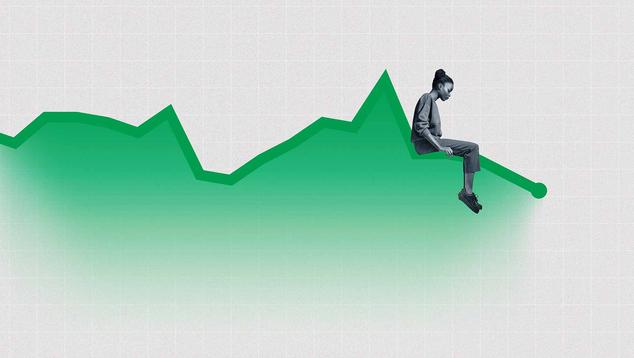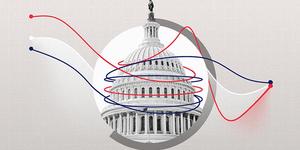WASHINGTON, D.C. -- Forty-four percent of Americans say they are “very satisfied” with the way things are going in their personal life, the lowest by two percentage points in Gallup’s trend dating back to 2001. This also marks the continuation of a decline in personal satisfaction since January 2020, when the measure peaked at 65%.
Another 37% of Americans today say they are “somewhat satisfied” with their personal life, while far fewer are “somewhat” (9%) or “very” (8%) dissatisfied. These findings are from Gallup’s annual Mood of the Nation poll, conducted Jan. 2-15, during President Joe Biden’s final weeks in office.
Gallup has asked Americans whether they are satisfied or dissatisfied with their personal life since 1979, adding the follow-up question measuring degree of satisfaction in 2001. The previous low point in Americans’ high personal satisfaction, 46%, occurred in 2011 when the country was still recovering from the 2007-2009 recession.
Similar sub-50% lows occurred at other times of economic uncertainty, including 47% readings in December 2008 during the global economic crisis and last year amid persistently weak economic confidence. Americans’ economic confidence remains in negative territory today, which is likely a factor in their latest personal satisfaction reading.
In contrast, personal satisfaction was highest when economic confidence was markedly high in January 2020, before the economic collapse precipitated by the COVID-19 pandemic.
Frequent Churchgoers, Wealthier Adults Most Likely to Be Very Satisfied
Americans in all key demographic subgroups have become less likely to say they are very satisfied with their personal life since early 2020, but Republicans have slipped the most (43 points). The five-point drop in the percentage of Democrats who are very satisfied is the smallest decline.
Democrats are among the groups registering significantly higher personal satisfaction than the national average. The others are U.S. adults with an annual household income of $100,000 or more, those who attend religious services at least weekly, college graduates, adults aged 65 and older, and women. Each of these groups is more likely than their counterparts to say they are very satisfied.
Americans Remain Much More Satisfied With Personal Life Than With U.S.
Although the percentage of Americans who are generally very satisfied with their personal life is at its lowest point, the combined share who are very or somewhat satisfied, 81%, is not the low point. Rather, the record low for the combined measure was 73% in July 1979 during the energy crisis.
In recent years, personal satisfaction levels have varied between 78% and 85%, putting the current measure near the middle but down significantly from the 90% high in January 2020.
Americans’ satisfaction with the way things are going in the U.S. contrasts sharply with their personal satisfaction. More than three-quarters of U.S. adults are “very” (50%) or “somewhat” (27%) dissatisfied with the country, while just one in five are somewhat (16%) or very (4%) satisfied.
Personal satisfaction has been consistently higher than national satisfaction since 1979, during Jimmy Carter’s presidency, when Gallup first asked these two questions. Personal satisfaction has also been less variable than national satisfaction.
Not only has dissatisfaction with the country outpaced satisfaction for more than 20 years, but the percentage of Americans saying they are very dissatisfied has been the largest group since 2006. The highest reading for extreme dissatisfaction in the polls it has been asked (typically once a year each January) was 66% in January 2021. The current 50% is above the average of 45% since 2006.
Partisanship is the greatest differentiator in satisfaction with the U.S. The 61% of Republicans and 40% of Democrats who are very dissatisfied with the U.S. illustrates the difference in views of partisans from the sitting president’s party and the opposing party. Although the survey was completed before Donald Trump’s inauguration, shifts in partisans’ satisfaction with the U.S. since last year suggest that their views had already begun to change. Republicans’ extreme dissatisfaction has fallen 13 points and Democrats’ has risen seven points since last year.
Bottom Line
After several challenging years that encompassed the COVID-19 pandemic and persistently high prices, Americans’ extreme satisfaction with their personal life has fallen to the lowest level in a quarter century, though the total percentage satisfied is significantly above the 1979 record low. Political discontent appears to have further depressed satisfaction, especially for Republicans.
Personal satisfaction continues to far outpace Americans’ satisfaction with the U.S. This dichotomy -- whereby Americans rate their own situation better than the nation’s -- is commonly seen in polling on a number of subjects, including crime, healthcare, education and the economy/personal finance.
Given that Donald Trump is back in the White House, history suggests that Republicans’ satisfaction with their own life and with the U.S. will improve and Democrats’ will worsen.
To stay up to date with the latest Gallup News insights and updates, follow us on X @Gallup.
Learn more about how the Gallup Poll Social Series works.
View complete question responses and trends (PDF download).




